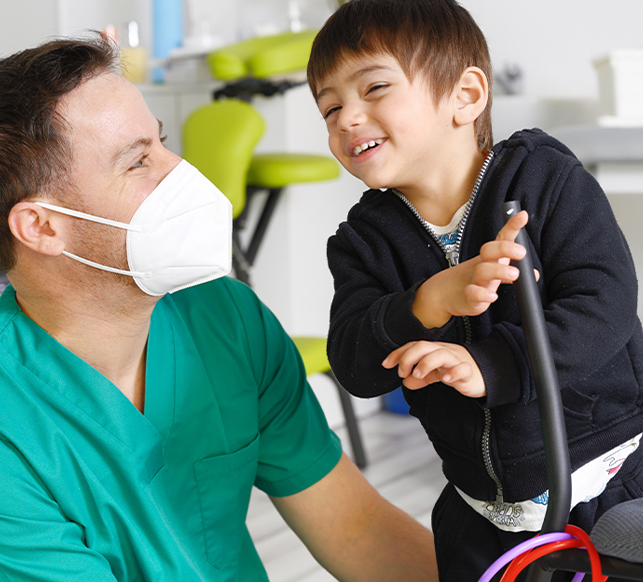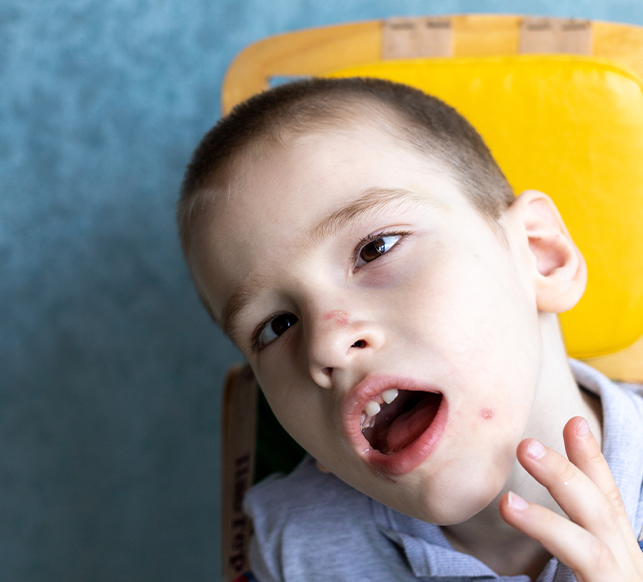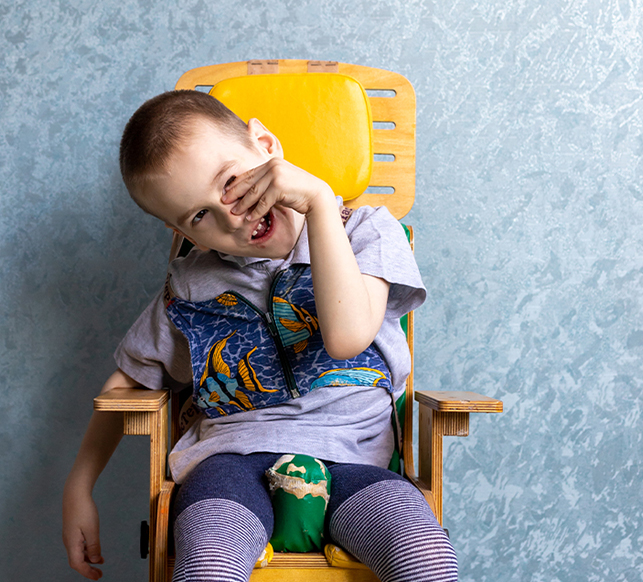Cerebral Palsy

We help ensure our clients with cerebal palsy live a fulfilling and happy life
The severity of Cerebral Palsy is different, depending on the type of cerebral palsy the individual has and the level of care they have received from a young age. The level of care is also variable. Some of our clients only require minimum assistance while others need a little more. Sufferers of Cerebral Palsy offer experience stiff muscles, together with poor balance and coordination. Our paediatric care services can help those suffering from cerebral palsy from a young age. It is possible for a child with cerebral palsy to grow into adulthood and live an independent life. This can help improve their self-worth, confidence, and ability to build relationships. As this is a condition that starts from an early age, it is vital that parents start dealing with it quickly. The earlier you get help with cerebral palsy, the more likely your child will be able to live independently in the future. As muscle training and exercise are a vital way to improve mobility and development, physical therapy is essential from childhood, and it is also worth considering occupational therapists and/or speech and language therapy.
We support our clients at home, allowing them to lead an independent life. We can provide care for those who need it, either on a temporary or permanent basis. We can cover a variety of shifts to suit your needs, including evenings and weekends, and we even offer emergency healthcare
What is cerebral palsy?
Cerebral palsy develops either during or straight after birth and as a motor disorder, it affects the brain. There are five types of cerebral palsy, and these are dependent on how severe the brain damage is. In the UK, around 1 in 400 births lead to cerebral palsy, and it can affect any social and ethnic groups. It may not be diagnosed until the child is 18 months old, although there are usually signs much earlier. For instance, the child may not be walking or speaking at the rate they should.


Types of cerebral palsy
Ataxic Cerebral Palsy
This is a less common type of cerebral palsy and this is where there is damage to the cerebellum, which helps to ensure muscle movements are coordinated and as such, ataxic cerebral palsy can lead to difficulties with coordination due to decreased muscle tone. The most noticeable sign of this is tremors, which are not unlike conditions such as Parkinson’s and it can make even the most simple tasks, such as tying shoelaces difficult or impossible. Although there is no cure for ataxic cerebral palsy, sufferers can use muscle relaxants to help ease the symptoms or if speech becomes an issue, there is the option of using a speech therapist.
At Harmony Healthcare, we work together with our clients suffering from ataxic cerebral palsy, assessing the condition and compiling a care plan that is right for your needs. We know that dealing with this condition or supporting a loved one with the condition is extremely challenging, and we aim to help ensure independent living and an enjoyable life is entirely possible. If you or your loved one is an adult living on their own with this condition, we can provide overnight care if this is a particularly stressful and difficult time, or we can refine our level of care to suit you. We are completely flexible and have healthcare staff covering a wide range of shifts, including evenings and weekends.
Athetoid Cerebral Palsy
Another type of cerebral palsy is athetoid cerebral palsy, which leads to problems with muscle movement control. It can lead to twisting, and sometimes abrupt movements. This is different to spastic cerebral palsy and ataxic cerebral palsy as these cause balance and walking issues, although it is entirely possible for people with the condition to have more than one type. There are instances when the condition can change and the symptoms can become different. For instance, a child may start with tremors but progress to speech problems in later life. It is difficult to know how the cerebral palsy will develop as everyone experiences it differently. It is advisable to take action as quickly as possible to deal with the effects of cerebral palsy. For instance, seeing a speech therapist straight away when speech issues become noticeable.
Our healthcare professionals can help make life easier for those suffering from this condition by administering medication where necessary, helping with tasks that might be unmanageable, bathing, dressing and preparing meals. These tasks can help make life easier for those suffering from athetoid cerebral palsy, and their families. You may need short term care for your child, weekend care or emergency care, and we are there to cater to your needs.
Mixed Type Cerebral Palsy
As mentioned earlier, it is not unknown for sufferers of cerebral palsy to have a mixed type, which means that they have more than one type. This can be even more challenging as the symptoms can be extremely variable. You may find that a lack of stability and trouble walking can prevent them from leading the life they desire, but with our help we will ensure that life is as enjoyable as possible.
Our healthcare professionals are experienced and dedicated to helping those living with cerebral palsy, no matter how severe the symptoms may be. We will make yours or your loved ones life as comfortable as possible, while also maintaining your independence. We understand the difficulties faced by those with cerebral palsy and their families, and we will always endeavour to offer as much help and support as you need.
Hypotonic Cerebral Palsy
Another type of cerebral palsy is hypotonic cerebral palsy which affects muscle tone. Sufferers of this type may experience overly relaxed muscles, which make the body seem ‘floppy.’ The inability to keep the muscles firm can lead to difficulties with everyday movements. As children struggle to move in a natural way. For instance, crawling and standing, they can become tired extremely quickly, as they try to keep up with other children. The lack of stability can be difficult to treat, but they may benefit from physical therapy.
Dealing with a child suffering from hypotonic cerebral palsy can be challenged and at Harmony Healthcare, we aim to make day to day life easier by helping to support them with functions that might seem impossible, such as feeding and administering medicines. Life can be stressful enough, and dealing with a child with this condition can make it even more challenging. Whether long term or short term needs when you need a break, our experienced healthcare professionals will be on hand to help and advise you in the best way to manage the condition. Our focus with our clients suffering from cerebral palsy is that they lead an independent life, and providing the treatment in the comfort of your home can help to achieve this.
Supporting children with cerebral palsy
There are a range of issues faced by children with cerebral palsy. The main challenges we recognise with our clients are motor and oral skills. It is our priority to work with other care providers, such as consultants to ensure that the treatment plan we devise is right and suitable for our client. The healthcare professionals supporting your child will have experience of dealing with children facing similar issues, and they will be able to support both their physical and emotional needs. The physical needs may include supporting with their mobility to allow them the freedom to walk and improve their independence. They may also help support feeding and personal care. The companionship offered by the healthcare professionals can help the child to prosper, and can help them develop their social interactions. Parents needs respite as it can be challenging providing such a high level of care to a child and that’s what we are there for. We offer a range of levels of care to support different circumstances, including respite care and short term care. Our flexibility is what makes us one of the most highly regarded Homecare company in the UK.
Case study for child with cerebral palsy
Lucy is a 6-year old girl with spastic cerebral palsy. Although she can walk and talk, her knees are crossed making it difficult to walk quickly or to take steps. Her parents work with a consultant and they do their best to try and guide Lucy to enable her to reach her full potential. Lucy is at school, and her parents work full-time. They have been looking after and supporting Lucy and their other 3 kids, which is causing them to, understandably, feel exhausted. The family really need a holiday, but unfortunately, it is extremely difficult for them to take Lucy anywhere, as she becomes exhausted quickly and has real difficulties with everyday movements. They have called us to ask if we can support Lucy while they go off on a break for a few days. Our healthcare professionals are only too happy to help and provide care at home for Lucy while her family enjoy a much-needed break. Our carer helps with feeding and personal care for Lucy, but encouraging her where possible to do these tasks herself. She only steps in when she can see that Lucy is really struggling. The carer stays overnight for the days that the family are away, ensuring she is kept comfortable. Lucy and the carer play together with a focus on trying to support her development during play. The carer gets to know Lucy and steps in whenever the family need any short term or respite care . Lucy loves when the carer visits and doesn’t feel like she is missing out. The family get to spend time together without worrying about the safety and happiness of their daughter. Lucy gets the help she needs to enhance her development and independence.
Supporting adults with cerebral palsy
There is no reason why adults suffering from cerebral palsy are not able to live an independent life, including have their own home and job. It may be that help is needed for adults living with cerebral palsy to help support their day to day lives, including pain control and self care. Our healthcare professionals will provide support based on the needs of the adults we support, while ensuring their independence is maintained. We will always do our best to encourage independent living and to enhance the quality of life of the adults we support. It may be the case that your family need to offer some support and you need our help with respite care or overnight care is required. Many clients live on their own, leading their own fulfilling life with their family, but may need care to give their family respite. Other clients with cerebral palsy need a more intense level of care, or may not be able to live on their own. Regardless of the circumstances, our aim is not to just offer support. We encourage our clients to do as much as they can for themselves, assisting them where required. We understand the importance of living an independent life, and how this affects self esteem, and this is our priority.